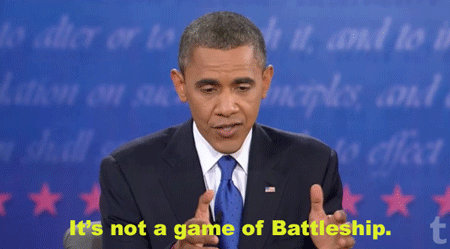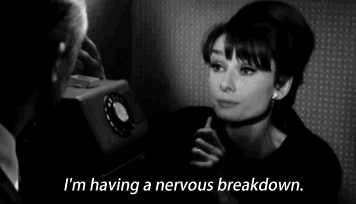We've found that when we mention the news on Iran to our friends, this is often the reaction we get:

So, we decided to break it down. This is the story of how the United States entered into the most recent round of negotiations with Iran, and what's going on with those negotiations right now.
1. It began in 2013 with a historic phone call between President Obama and Iranian President Rouhani. The call went well:
2. And led to a productive round of talks between Iran and the P5+1 (a group that includes Russia, China, the United Kingdom, France, Germany, and the United States). These negotiations addressed the issue of Iran's nuclear program, a program the U.S. feared might be used to develop nuclear weapons.
3. Tough international sanctions helped to bring Iran to the negotiating table, but even after they'd succeeded, Congress kept trying to impose harsh sanctions on Iran right in the middle of negotiations, which made us feel like this:
4. Nevertheless, in November 2013, Iran and the P5+1 agreed to an interim deal called the Joint Plan of Action. The 6 month agreement meant Iran would pause key aspects of its nuclear program while allowing for greater transparency and verification of its activities by the UN's nuclear watchdog, the IAEA. In exchange, the P5+1 would provide temporary sanctions relief. You can imagine our excitement:
5. And our reaction when the first IAEA report praised Iran for sticking to its side of the deal:
6. And when Iran met with additional measures on time (such as capping its levels of 5% enriched uranium, allowing facility inspections by the IAEA, and diluting its stockpile of highly enriched uranium), we felt like this:
7. But the six months of the interim agreement are almost over now, and hardliners in both Iran and the U.S. threaten the success of a final comprehensive agreement. This is how we feel when Congress tries to interfere with the negotiations:
8. And when someone suggests we should reverse our policy towards Iran and increase sanctions:
9. And our emotions with only a few days left until the July 20 deadline are something along the lines of this:

10. But above all else, we continue to believe that diplomacy will triumph over weapons of mass destruction, and a final comprehensive agreement can and will be reached. That's why we're feeling pretty good about the possibility of another six months to come up with a deal.

